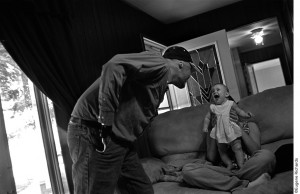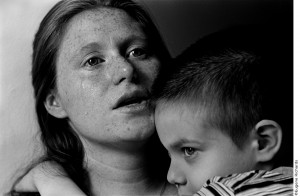Eugene Richards - War is Personal
It was 2006; the war in Iraq was in its fourth year. No weapons of mass destruction had been found. There were reports of tens of thousands of dead and injured Iraqis, of more than 2,000 dead American soldiers, of rising rates of depression and suicide among American military personnel. All the while Congress and the media debated what the conflict was costing America in image and treasure, the president in popularity. Troubled by the public’s growing indifference to the tragedy of Iraq and critical of my own inaction, I set out on what would be a years-long journey to document the lives of Americans who’d been profoundly affected by the war.
Carlos Arredondo is a broken man, a man who can’t help but blame himself for the death of his Marine son; Tomas Young, a paralyzed veteran full of rage; Kimberly Rivera, an aggrieved soldier who, instead of returning to Iraq, makes the fateful decision to defect to Canada; Michael Harmon, a combat veteran who has come home, but to a place he feels he no longer belongs; Nelida Bagley, a fiercely protective mother still clinging to the belief that her brain-injured son can be healed, isn’t gone from her forever.
War Is Personal is a study of lives in upheaval, a chronicle of greatly differing experiences and perceptions of what it means to go to war, to wait, to mourn, to remember, to live on when those that you love are gone.
Eugene Richards - Biography

Born in Dorchester, Massachusetts, Eugene Richards earned a degree in English and journalism before studying photography with Minor White. In 1968, after protesting the war in Vietnam, he joined VISTA and was assigned to eastern Arkansas, where he helped found a social service organization and a community newspaper that reported on black political action and the Ku Klux Klan. Richards’s first publication was Few Comforts or Surprises: The Arkansas Delta (1973), followed by Dorchester Days (1978), a portrait of the inner-city neighborhood where he was raised.
Eugene Richards’s subsequent books include Exploding Into Life (1986), which chronicles his first wife’s struggle with breast cancer; Cocaine True, Cocaine Blue (1994), a study of the impact of hardcore drugs on American cities, The Fat Baby (2004), a collection of fifteen textual and photographic essays, The Blue Room, his study in color of abandoned houses in rural America, and A Procession of Them, which confronts the plight of the institutionalized mentally disabled. His most recent book, War Is Personal, is a documentation in words and pictures of the consequences of the Iraq war.
Among numerous honors, Richards has won a Guggenheim Fellowship, National Endowment for the Arts grants, the W. Eugene Smith Memorial Award, the National Geographic Magazine Grant for Photography, the Getty Images Grant for Editorial Photography, and, most recently, the Amnesty International Media Award. His film, But, the day came, which chronicles the passage of an elderly Nebraska farmer to a nursing home, received the Best Short Film award at the Full Frame Documentary Film Festival.









